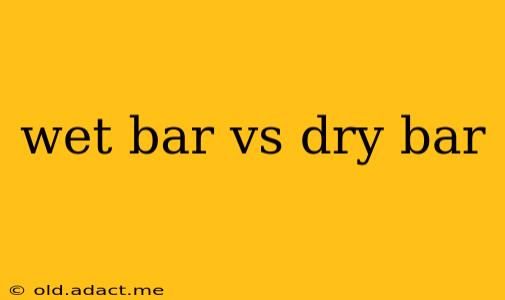Planning a home bar? The terms "wet bar" and "dry bar" might seem straightforward, but understanding the nuances is crucial for designing the perfect space. This comprehensive guide explores the key distinctions, helping you decide which option best suits your lifestyle and needs.
What is a Wet Bar?
A wet bar is a fully functional bar area equipped with plumbing for a sink and potentially a refrigerator or ice maker. This allows for easy access to water for mixing drinks, washing glasses, and cleaning up spills. The key features that define a wet bar include:
- Plumbing: A built-in sink with hot and cold running water is the defining characteristic of a wet bar. This simplifies the process of making and serving drinks.
- Refrigeration: Many wet bars incorporate a built-in refrigerator or a mini-fridge to keep drinks and ingredients chilled. This is a highly convenient feature.
- Ice Maker: An integrated ice maker eliminates the need for frequent ice trips to the main kitchen, enhancing the bar's functionality.
- Disposal (Optional): Some higher-end wet bars include a garbage disposal for easy cleanup of fruit peels, ice, and other bar-related waste.
What is a Dry Bar?
A dry bar lacks the plumbing features of its wet counterpart. It serves as a stylish storage and serving area for drinks and barware, but it doesn't have a sink. This means you'll need to rely on a nearby kitchen sink for cleaning. Dry bars are characterized by:
- No Plumbing: This is the primary difference; no sink or water connections are present.
- Storage: Dry bars often feature ample storage for liquor bottles, glasses, bar tools, and other accessories.
- Aesthetic Focus: Dry bars prioritize design and style, often serving as a focal point in a room.
Wet Bar vs. Dry Bar: Which One is Right for You?
The choice between a wet bar and a dry bar largely depends on your individual needs and preferences. Consider the following factors:
- Frequency of Use: If you frequently entertain or enjoy making cocktails at home, a wet bar will offer superior convenience and functionality. A dry bar is perfectly suitable for occasional use or if your primary focus is on aesthetics.
- Budget: Wet bars typically cost more to install due to the added plumbing and potential appliance costs. Dry bars are generally less expensive.
- Space Constraints: Wet bars require more space to accommodate plumbing and appliances. If space is limited, a dry bar might be a more practical option.
- Lifestyle: Do you frequently host parties and gatherings? A wet bar will enhance the experience. If you prefer a more minimalist approach, a dry bar may suffice.
What are the benefits of a wet bar?
A wet bar offers several advantages:
- Convenience: Having a sink and potentially a refrigerator right where you're mixing drinks makes the entire process much smoother.
- Cleanliness: Cleaning up spills and glasses is significantly easier with a dedicated sink.
- Entertainment Value: A wet bar adds a touch of sophistication and functionality to any entertainment space.
What are the benefits of a dry bar?
Dry bars offer these benefits:
- Cost-Effective: They are generally less expensive to install than wet bars.
- Design Flexibility: They offer more design flexibility since they aren't constrained by plumbing requirements.
- Space Saving: Dry bars can be installed in smaller spaces than wet bars.
How much does it cost to install a wet bar?
The cost of installing a wet bar varies greatly depending on factors such as the size, complexity, and materials used. Expect to spend significantly more than on a dry bar installation. It's best to get quotes from multiple contractors to get an accurate estimate.
How much does it cost to install a dry bar?
The cost of a dry bar installation will depend on the size, materials, and any custom features you choose to incorporate. It’s typically a less expensive option compared to a wet bar.
Can I convert a dry bar to a wet bar?
Converting a dry bar to a wet bar is possible, but it can be a complex and potentially expensive undertaking, requiring significant plumbing work. It's crucial to consult with a licensed plumber to assess the feasibility and cost of such a conversion.
By carefully considering these factors, you can make an informed decision about whether a wet bar or a dry bar is the right choice for your home. Remember to consult with professionals for accurate cost estimates and installation guidance.
